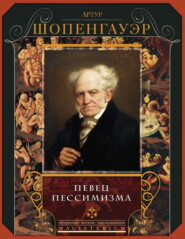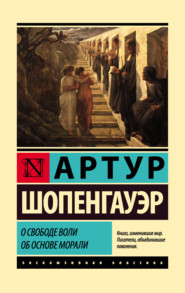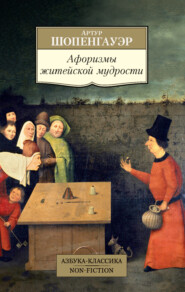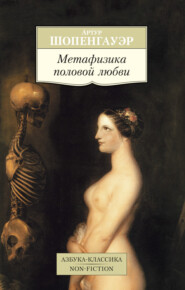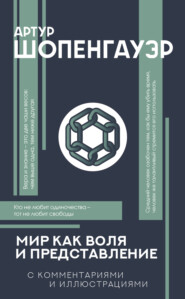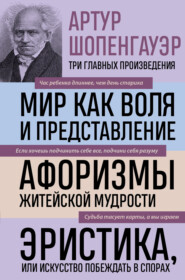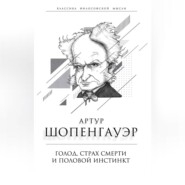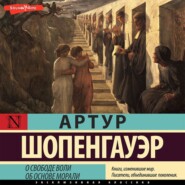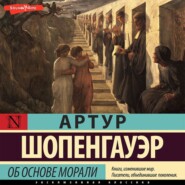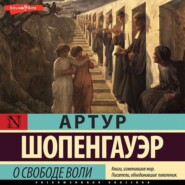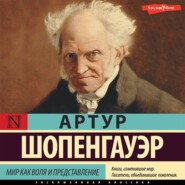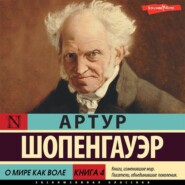По всем вопросам обращайтесь на: info@litportal.ru
(©) 2003-2024.
✖
The Essays of Arthur Schopenhauer; Counsels and Maxims
Настройки чтения
Размер шрифта
Высота строк
Поля
Translator's Note. – Rev. James Beresford (1764-1840), miscellaneous writer. The full title of this, his chief work, is "The Miseries of Human Life; or the last groans of Timothy Testy and Samuel Sensitive, with a few supplementary sighs from Mrs. Testy."
52
This is a truth which I have firmly established in my prize-essay on the Freedom of the Will, where the reader will find a detailed explanation of the grounds on which it rests. Cf. especially p. 60. [Schopenhauer's Works, 4th Edit., vol. iv. —Tr.]
53
Cf. Welt als Wille und Vorstellung, Bk. I. p. 361 (4th edit.).
54
Iliad, xxiii. 313, sqq.
55
Virgil, Aeneid, vi. 95.
56
Horace, Odes iii. 3.
57
De Iside et Osiride ch. 14.
58
De Sapientia Veterum, C. 6. Natura enim rerum omnibus viventibus indidit mentum ac formidinem, vitae atque essentiae suae conservatricem, ac mala ingruentia vitantem et depellentem. Verumtamen eaden natura modum tenere nescia est: sed timoribus salutaribus semper vanos et innanes admiscet; adeo ut omnia (si intus conspici darentur) Panicis terroribus plenissima sint praesertim humana.
59
Translator's Note. – Schopenhauer refers to Die Welt als Wille und Vorstellung, Bk. II. c, 31, p. 451 (4th edit.), where he explains that this is due to the fact that at that period of life the brain and nervous system are much more developed than any other part of the organism.
60
Translator's Note. – This statement is not quite correct. The weight of the brain increases rapidly up to the seventh year, more slowly between the sixteenth and the twentieth year, still more slowly till between thirty and forty years of age, when it attains its maximum. At each decennial period after this, it is supposed to decrease in weight on the average, an ounce for every ten years.
61
Die Welt als Wille und Vorstellung, Bk. II. c. 31, p. 426-7 (4th Edit.), to which the reader is referred for a detailed explanation of my meaning.
62
Cf. loc. cit., p. 428.
63
Let me refer the reader, if he is interested in the subject, to the volume already cited, chapter 37.
64
Translator's Note. – Moritz was a miscellaneous writer of the last century (1757-93). His Anton Reiser, composed in the form of a novel, is practically an autobiography.
65
Kritik der Urtheilskraft, Part I, § 29, Note ad fin.
66
Translator's Note. – By this remark Schopenhauer means that will, which, as he argues, forms the inner reality underlying all the phenomena of life and nature, is not in itself affected by time; but that, on the other hand, time is necessary for the objectification of the will, for the will as presented in the passing phenomena of the world. Time is thus definable as the condition of change, and the present time as the only point of contact between reality and appearance.
67
Politics.
68
Cf. Horace, Epist. I. 12, I-4.
69
See Die Welt als Wille und Vorstellung, Bk. II. ch. 41, for a further description of this happy end to life.
70
Ecclesiastes vii. 1.
71
The life of man cannot, strictly speaking, be called either long or short, since it is the ultimate standard by which duration of time in regard to all other things is measured.
In one of the Vedic Upanishads (Oupnekhat, II.) the natural length of human life is put down at one hundred years. And I believe this to be right. I have observed, as a matter of fact, that it is only people who exceed the age of ninety who attain euthanasia, – who die, that is to say, of no disease, apoplexy or convulsion, and pass away without agony of any sort; nay, who sometimes even show no pallor, but expire generally in a sitting attitude, and often after a meal, – or, I may say, simply cease to live rather than die. To come to one's end before the age of ninety, means to die of disease, in other words, prematurely.
Now the Old Testament (Psalms xc. 10) puts the limit of human life at seventy, and if it is very long, at eighty years; and what is more noticeable still, Herodotus (i. 32 and iii. 22) says the same thing. But this is wrong; and the error is due simply to a rough and superficial estimate of the results of daily experience. For if the natural length of life were from seventy to eighty years, people would die, about that time, of mere old age. Now this is certainly not the case. If they die then, they die, like younger people, of disease; and disease is something abnormal. Therefore it is not natural to die at that age. It is only when they are between ninety and a hundred that people die of old age; die, I mean, without suffering from any disease, or showing any special signs of their condition, such as a struggle, death-rattle, convulsion, pallor, – the absence of all which constitutes euthanasia. The natural length of human life is a hundred years; and in assigning that limit the Upanishads are right once more.
52
This is a truth which I have firmly established in my prize-essay on the Freedom of the Will, where the reader will find a detailed explanation of the grounds on which it rests. Cf. especially p. 60. [Schopenhauer's Works, 4th Edit., vol. iv. —Tr.]
53
Cf. Welt als Wille und Vorstellung, Bk. I. p. 361 (4th edit.).
54
Iliad, xxiii. 313, sqq.
55
Virgil, Aeneid, vi. 95.
56
Horace, Odes iii. 3.
57
De Iside et Osiride ch. 14.
58
De Sapientia Veterum, C. 6. Natura enim rerum omnibus viventibus indidit mentum ac formidinem, vitae atque essentiae suae conservatricem, ac mala ingruentia vitantem et depellentem. Verumtamen eaden natura modum tenere nescia est: sed timoribus salutaribus semper vanos et innanes admiscet; adeo ut omnia (si intus conspici darentur) Panicis terroribus plenissima sint praesertim humana.
59
Translator's Note. – Schopenhauer refers to Die Welt als Wille und Vorstellung, Bk. II. c, 31, p. 451 (4th edit.), where he explains that this is due to the fact that at that period of life the brain and nervous system are much more developed than any other part of the organism.
60
Translator's Note. – This statement is not quite correct. The weight of the brain increases rapidly up to the seventh year, more slowly between the sixteenth and the twentieth year, still more slowly till between thirty and forty years of age, when it attains its maximum. At each decennial period after this, it is supposed to decrease in weight on the average, an ounce for every ten years.
61
Die Welt als Wille und Vorstellung, Bk. II. c. 31, p. 426-7 (4th Edit.), to which the reader is referred for a detailed explanation of my meaning.
62
Cf. loc. cit., p. 428.
63
Let me refer the reader, if he is interested in the subject, to the volume already cited, chapter 37.
64
Translator's Note. – Moritz was a miscellaneous writer of the last century (1757-93). His Anton Reiser, composed in the form of a novel, is practically an autobiography.
65
Kritik der Urtheilskraft, Part I, § 29, Note ad fin.
66
Translator's Note. – By this remark Schopenhauer means that will, which, as he argues, forms the inner reality underlying all the phenomena of life and nature, is not in itself affected by time; but that, on the other hand, time is necessary for the objectification of the will, for the will as presented in the passing phenomena of the world. Time is thus definable as the condition of change, and the present time as the only point of contact between reality and appearance.
67
Politics.
68
Cf. Horace, Epist. I. 12, I-4.
69
See Die Welt als Wille und Vorstellung, Bk. II. ch. 41, for a further description of this happy end to life.
70
Ecclesiastes vii. 1.
71
The life of man cannot, strictly speaking, be called either long or short, since it is the ultimate standard by which duration of time in regard to all other things is measured.
In one of the Vedic Upanishads (Oupnekhat, II.) the natural length of human life is put down at one hundred years. And I believe this to be right. I have observed, as a matter of fact, that it is only people who exceed the age of ninety who attain euthanasia, – who die, that is to say, of no disease, apoplexy or convulsion, and pass away without agony of any sort; nay, who sometimes even show no pallor, but expire generally in a sitting attitude, and often after a meal, – or, I may say, simply cease to live rather than die. To come to one's end before the age of ninety, means to die of disease, in other words, prematurely.
Now the Old Testament (Psalms xc. 10) puts the limit of human life at seventy, and if it is very long, at eighty years; and what is more noticeable still, Herodotus (i. 32 and iii. 22) says the same thing. But this is wrong; and the error is due simply to a rough and superficial estimate of the results of daily experience. For if the natural length of life were from seventy to eighty years, people would die, about that time, of mere old age. Now this is certainly not the case. If they die then, they die, like younger people, of disease; and disease is something abnormal. Therefore it is not natural to die at that age. It is only when they are between ninety and a hundred that people die of old age; die, I mean, without suffering from any disease, or showing any special signs of their condition, such as a struggle, death-rattle, convulsion, pallor, – the absence of all which constitutes euthanasia. The natural length of human life is a hundred years; and in assigning that limit the Upanishads are right once more.






